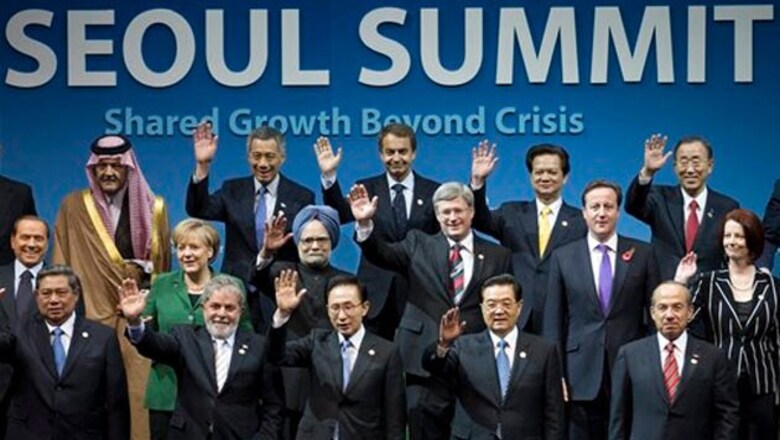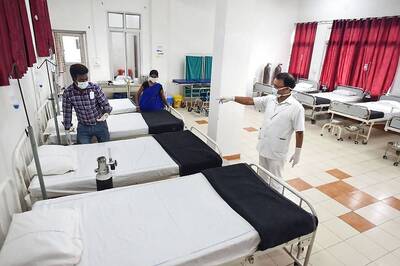
views
Seoul: In the midst of a raging war over currency exchange rate between the US and China at the G20 Summit in Seoul, India on Friday cautioned against competitive devaluation and resist any resurgence of protectionism.
India also spoke against talk of putting a cap on current account balance, proposed by the US at four per cent of the Gross Domestic Product (GDP), saying it is not not easy to reach agreement on what are sustainable current account balances for individual countries given the structural differences across the countries.
India's forthright views on these and major issues troubling the fifth G20 Summit here put forward by Prime Minister Manmohan Singh, who spoke at the Plenary Session of the Summit that opened this morning under South Korean Presidency chaired by President Lee Myung-bak.
US President Barack Obama, Chinese President Hu Jintao, British Prime Minister David Cameron, Canadian Prime Minister Stephen Harper, French President Nicolas Sarkozy and German Chancellor Angela Merkel are among a host of world leaders attending the Summit.
"First, we must at all costs avoid competitive devaluation and resist any resurgence of protectionism," the Prime Minister said on the raging issue of the US attempts to make China reevaluate its currency yuan and America pumping in $ 600 billion into its economy that will effectively undervalue the dollar.
On the US attempts to cap current account balances at 4 per cent, the Prime Minister said "it is not easy to reach agreement on what are sustainable current account balances for individual countries given the structural differences across countries, the many uncertainties that prevail, and the multiple goals that each country has to balance."
Despite these difficulties, Singh said the G20 must persevere to develop a workable mechanism for international coordination.
Noting that there is considerable agreement on some broad principles, Singh said advanced deficit countries must follow policies of fiscal consolidation, consistent with their individual circumstances so as to ensure debt sustainability over the medium term.
"This means that fiscal correction need not be front-loaded everywhere... while structural reforms are necessary everywhere, these should increase efficiency and competitiveness in deficit countries, while expanding internal demand in surplus countries. This re-balancing will take time, but it must begin," he said.
Singh said exchange rates flexibility is an important instrument for achieving a sustainable current account position and policies must reflect this consideration.
To these well known ingredients, the Prime Minister said, he would add another that has not been sufficiently discussed.
"Even as we try to avoid a destabilising surge of volatile capital flows to developing countries, there is a strong case for supporting long term flows to these countries to stimulus investment, especially in infrastructure," he said.
Singh said the economic performance of emerging markets, including many countries in sub-Saharan Africa, has improved greatly in recent years.
He said these countries are now in a position to absorb capital flows aimed at an expansion in investment, which would inject much needed demand into the global economy and that Multilateral Development Banks have an important role to play in this process through recycling of global savings.
"Many emerging market countries are also in a position to attract private investment, including into infrastructure," he said.
"Recycling surplus savings into investment in developing countries will not only address the immediate demand imbalance, it will also help to address developmental imbalances. In other words, we should leverage imbalances of one kind to redress imbalances of the other kind," he told the G-20 leaders.
Prime Minister Singh said high unemployment in industrialised countries threatens a revival of protectionist sentiment, especially since the use of conventional monetary and fiscal tools to revive the economy has been exhausted.
"Uncertainty about the prospects of industrialised countries affects the investment climate and dampens the medium term growth prospects of emerging market countries. All this suggests that much remains to be done to bring our economies back to the path of strong, sustainable and balanced growth," he said.
Noting that the problem facing the G20 countries in rebalancing the global economy is well known, he said major industrialised countries were running unsustainable current account deficits which have to be reduced to manageable levels.
"If this is not to have a contractionary impact on the world economy, it must be offset by reducing current account surpluses elsewhere. This rebalancing requires pursuit of appropriately coordinated policies in our countries," Singh said.
He said the Mutual Assessment Process adopted last year during the 3rd G20 Summit in Pittsburgh in the US was a unique initiative to achieve such coordination.
Singh said the members of the grouping saw the outcome of the first stage in Toronto at the level of country groupings and had expected to move to the second stage of considering country specific recommendations by the time of the Seoul Summit.
"The G20 would convey a powerful signal to markets if we commit ourselves to a second stage MAP process aimed at coordinating policies in these areas," he said.
Singh said Finance Ministers and Central Bank Governors of G20 countries "could be asked to develop these ideas further, with the assistance of the IMF and produce, as quickly as possible, a credible approach to identifying sustainable trajectories for external balances for our countries and to assess the policies proposed by each country to achieve these."
"I recognise this is not going to be easy and we must allow considerable flexibility to accommodate learning by doing. However, if we can actually do this, we will have made a lasting contribution to a new style of global governance," the Prime Minister said.
Singh complimented the Korean presidency for the initiative it took to include development as an accepted item in the agenda of the G20.
"The G20 was born at the time of a crisis and as such it has been preoccupied with the short term agenda of crisis management and global rebalancing. However, one of the biggest imbalances facing us the development imbalance and putting development on the G20 agenda fills an important gap," he said.
He said developing countries performed well in the years before the crisis and have also done well in subsequent years.
"However, we need to ensure that the global economic environment, including especially the environment for trade, and investment flows remains strongly supportive of development," Singh said.


















Comments
0 comment